Newsletter 02/2018
Research
Two new joint DFG projects approved: MARZIPAN and ESTIMATE
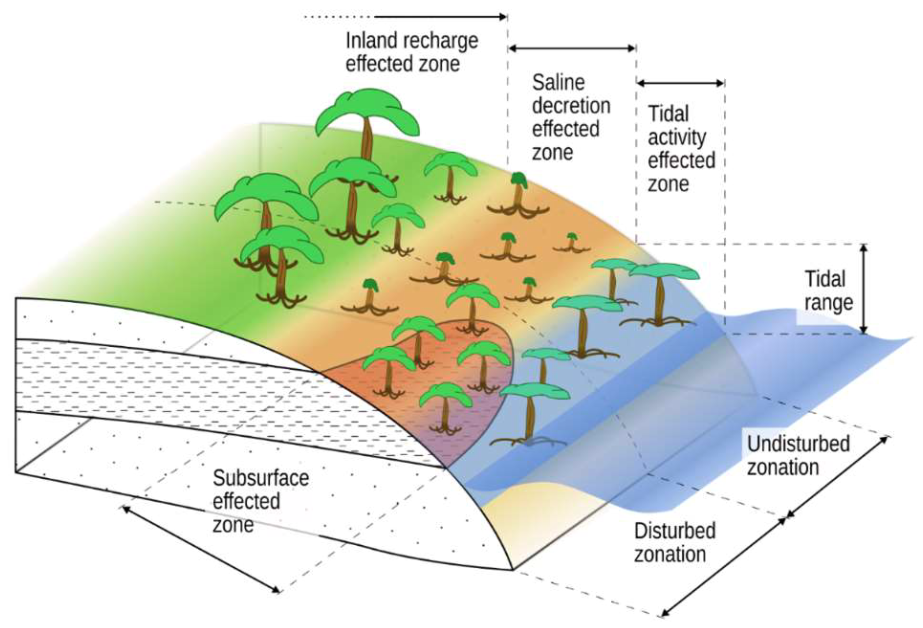 Typical mangrove zonation patterns hypothetically influenced by subsurface properties (© Marc Walther, TUD)
In March 2018, two new joint CAWR projects funded by the DFG will start, both with a duration of 3 years.
Typical mangrove zonation patterns hypothetically influenced by subsurface properties (© Marc Walther, TUD)
In March 2018, two new joint CAWR projects funded by the DFG will start, both with a duration of 3 years.
Within the MARZIPAN project, researchers from the TUD Chair of Forest Biometry and Forest System Analysis and the UFZ Department Environmental Informatics jointly work on developing methods which can help to gain information on subsurface aquifer structures based on surface vegetation patterns. Aims of the project are to gain insights into the relationship between visible vegetation patterns such as tree allometry, species composition and zonation on the one hand and subsurface aquifer structures and potential gradients on the other hand. In addition, physical mechanisms of belowground plant interaction will be elucidated and new plant interaction approaches for individual based simulation models will be derived. Concerning the methodological approach, the scientists will work with model coupling of individual-based and continuum-based models utilizing process-based concepts to represent flow and mass transport, as well as with numerical simulation of coupled tree groundwater models with increasing complexity.More information here.
The ESTIMATE project deals with the impact of internal and external stressors on DNAPL contaminant (organic phase with a density higher than water) source zone formation and their implications for final contaminant plume extension in the aquifer. Scientists from the UFZ Department Monitoring and Exploration Technologies and the TUD Chairs of Groundwater Management and Contaminant Hydrology are involved in the planned research. There is not much known concerning the formation of DNAPL source zones, therefore they are usually approximated as point or line sources in numerical models. The resulting uncertainty is compensated through calibration in plume length. The project consortium wants to better understand the influences of temporal dynamics (e.g. aquifer recharge) and spatial heterogeneity (e.g. layering) during source zone formation, with the aim to be able to derive the effective source zone geometry based on major site characteristics. Laboratory scale tank experiments will be conducted as well as numerical modelling of laboratory setups and a transfer to the field scale. More information here.
 Real world DNAPL source zone, transformation to effective source zone (© Christian Engelmann, TUD)
Real world DNAPL source zone, transformation to effective source zone (© Christian Engelmann, TUD)
Exceptional PhD dissertation by Julia Vanessa Kunz
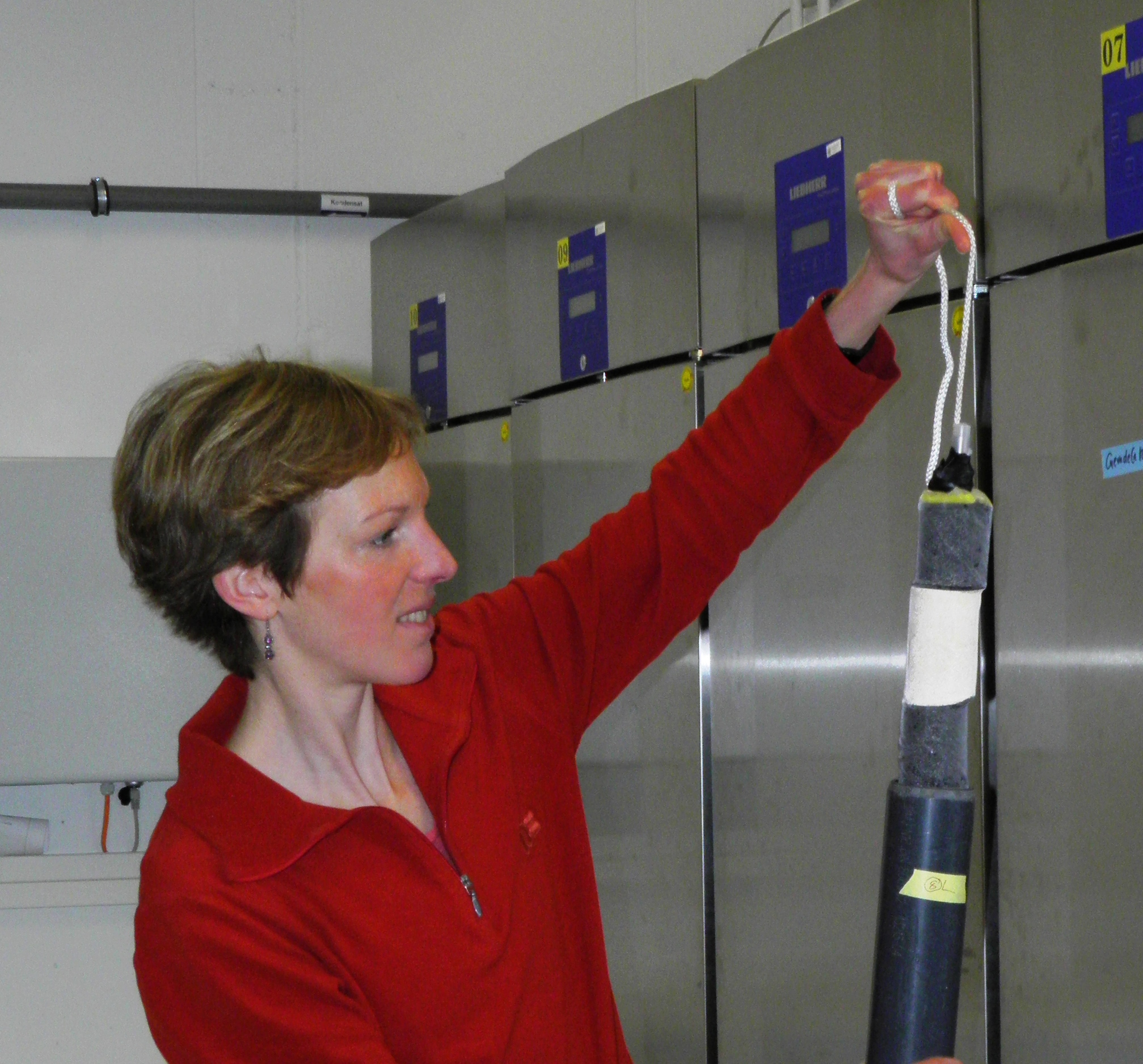 Dr. Vanessa Kunz with the "Hyporheic Passive Flux Meter" she developed © V. Kunz
Dr. Julia Vanessa Kunz who worked in the UFZ Department Aquatic Ecosystems Analysis under supervision of Prof Dietrich Borchardt has defended her PhD thesis on „Quantitative assessment of nitrogen dynamics in anthropogenically modified rivers and hyporheic zones“ at TU Dresden on Dec 21st, 2017 with the grade Summa cum laude (with distinction). She has developed new transferable methods for the in situ determination of substance turnover in rivers and streams: on the one hand using high resolution sensors in order to cover a complete river section, and on the other hand using a flux meter for the hyporheic zone which was newly developed in the framework of the thesis. For the first time, these methods allow a direct, quantitative measurement of nitrogen turnover also in larger streams as well as in the hyporheic zone, and will therefore lead to new scientific findings and opportunities for monitoring of substance retention in rivers.
Dr. Vanessa Kunz with the "Hyporheic Passive Flux Meter" she developed © V. Kunz
Dr. Julia Vanessa Kunz who worked in the UFZ Department Aquatic Ecosystems Analysis under supervision of Prof Dietrich Borchardt has defended her PhD thesis on „Quantitative assessment of nitrogen dynamics in anthropogenically modified rivers and hyporheic zones“ at TU Dresden on Dec 21st, 2017 with the grade Summa cum laude (with distinction). She has developed new transferable methods for the in situ determination of substance turnover in rivers and streams: on the one hand using high resolution sensors in order to cover a complete river section, and on the other hand using a flux meter for the hyporheic zone which was newly developed in the framework of the thesis. For the first time, these methods allow a direct, quantitative measurement of nitrogen turnover also in larger streams as well as in the hyporheic zone, and will therefore lead to new scientific findings and opportunities for monitoring of substance retention in rivers.
UFZ#CAWR ChinaConcept published
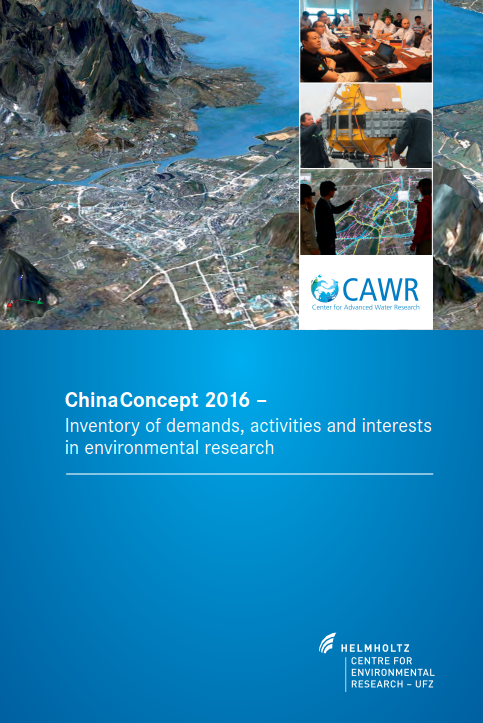 A detailed inventory of UFZ#CAWR research and transfer activities in China was published in early 2018 and can be downloaded as a pdf here. The published concept serves to structure the manifold activities and to support a coordinated appearance of CAWR and UFZ as a research center. The brochure that is now available can also be utilised as an expression of interest for follow-up research in China and as a basis for the shaping of current and future cooperation in environmental research. As continuity as an important factor for success in scientific collaboration with the PR of China, also the ChinaConcept will be updated and further developed continuously. In case you are interested in being included in the China Mailinglist, or you can report further activities that took place in 2017, please don’t hesitate to contact us! Contact:
M. Braeckevelt
or
Ursula Schmitz
.
A detailed inventory of UFZ#CAWR research and transfer activities in China was published in early 2018 and can be downloaded as a pdf here. The published concept serves to structure the manifold activities and to support a coordinated appearance of CAWR and UFZ as a research center. The brochure that is now available can also be utilised as an expression of interest for follow-up research in China and as a basis for the shaping of current and future cooperation in environmental research. As continuity as an important factor for success in scientific collaboration with the PR of China, also the ChinaConcept will be updated and further developed continuously. In case you are interested in being included in the China Mailinglist, or you can report further activities that took place in 2017, please don’t hesitate to contact us! Contact:
M. Braeckevelt
or
Ursula Schmitz
.
Scientific Events
Workshop on Persistent Mobile Organic Chemicals (PMOC) in the water cycle
On November 23rd/24th, a Workshop on „Persistent and Mobile Organic Chemicals in the Water Cycle: Linking science, technology and regulation to protect drinking water quality” was organized in Leipzig in the framework of the Water JPI project PROMOTE (Protecting Water Resources from Mobile Trace Chemicals). The event was hosted by Prof. Thorsten Reemtsma from the UFZ Department Analytics and brought together science, administration and industry in order to discuss the state of the art and current challenges concerning Persistent Mobile Organic Chemicals (PMOCs) in the water cycle, including their impact on drinking water quality. A specific focus was laid on elaborating potential solutions (prevention and removal) that technologies and regulation may provide. The Workshop participants dealt with questions of identification, occurrence and fate of PMOC in the water cycle, the contribution of REACH to the protection of drinking water ressources, potential decrease in emissions by the chemical industry, barrier technologies for controlling the input of PMOCs, as well as the necessity of water quality standards. More information here.
ArKoNaVera: CAWR project honored by UN Decade on Biodiversity
 Award ceremony at TU Dresden's Dülfersaal, right: The award is presented to the consortium by Saxon State Minister for the Environment and Agriculture Thomas Schmidt. © Jana Schneider (left) / Klemens Schwanebeck (right)
Since mid 2015, the TUD Institute for Hydrobiology and the UFZ
Department of River Ecology jointly work towards the protection and
preservation of indigenous species of large freshwater mussels in the
framework of the CAWR project ArKoNaVera. Their project partners are TU
Munich, the Fraunhofer Center for International Management and Knowledge
Economy (IMW), the Saxon State Foundation for Nature and Environment /
Nature Conservation Fund, the District of Passau, the District
Administration Office Vogtlandkreis and the SME Society for Water Management, Water Ecology and Environmental Planning (WAGU). Together
they strive to stabilize the populations of freshwater pearl mussel
(Margaritifera margaritifera) and painter’s mussel (Unio pictorum) in
Lower Bavaria and Saxony, as well as to restore their natural
self-reproduction ability. The great freshwater mussels are severely
endangered - and in case of the freshwater pearl mussel even threatened
with extinction - by high input of fine sediments, changes in water
chemistry (e.g. nutrient input, pharmaceutical residues), river
regulation and engineering measures and lack of host fish species. In
the framework of the UN Decade on Biodiversity, the project was selected
and honored by the expert jury in the competition on Biodiversity
(Competition Title: “Mussel protection 2.0 - Challenges in maintaining
natural water filters”). The award certificate was handed over to the
project consortium by the Saxon Minister of State Thomas Schmidt on
January 23rd in a ceremony with about 80 guests. The program of the
event was complemented by scientific presentations and an exhibition.
More information (in german) here and here.
Award ceremony at TU Dresden's Dülfersaal, right: The award is presented to the consortium by Saxon State Minister for the Environment and Agriculture Thomas Schmidt. © Jana Schneider (left) / Klemens Schwanebeck (right)
Since mid 2015, the TUD Institute for Hydrobiology and the UFZ
Department of River Ecology jointly work towards the protection and
preservation of indigenous species of large freshwater mussels in the
framework of the CAWR project ArKoNaVera. Their project partners are TU
Munich, the Fraunhofer Center for International Management and Knowledge
Economy (IMW), the Saxon State Foundation for Nature and Environment /
Nature Conservation Fund, the District of Passau, the District
Administration Office Vogtlandkreis and the SME Society for Water Management, Water Ecology and Environmental Planning (WAGU). Together
they strive to stabilize the populations of freshwater pearl mussel
(Margaritifera margaritifera) and painter’s mussel (Unio pictorum) in
Lower Bavaria and Saxony, as well as to restore their natural
self-reproduction ability. The great freshwater mussels are severely
endangered - and in case of the freshwater pearl mussel even threatened
with extinction - by high input of fine sediments, changes in water
chemistry (e.g. nutrient input, pharmaceutical residues), river
regulation and engineering measures and lack of host fish species. In
the framework of the UN Decade on Biodiversity, the project was selected
and honored by the expert jury in the competition on Biodiversity
(Competition Title: “Mussel protection 2.0 - Challenges in maintaining
natural water filters”). The award certificate was handed over to the
project consortium by the Saxon Minister of State Thomas Schmidt on
January 23rd in a ceremony with about 80 guests. The program of the
event was complemented by scientific presentations and an exhibition.
More information (in german) here and here.
Sino-German Workshop on Water Management in Beijing
International guests of the Symposium during the panel discussion (© GIZ)
On December 13th and 14th, 2017, the GIZ - who is one of the transfer partners of CAWR - organized a Symposium on Water Management together with the Appraisal Center for Environment &
Engineering (ACEE) of the Chinese Ministry of Environmental Protection (MEP). The event was part of the BMUB-funded IKI Project "Sino-German Environmental Partnership II". The focus of the Symposium was on the management of toxic and hazardous substances in water bodies and in the water cycle in general, with a special attention to experiences made in Germany concerning point-source and diffuse contamination and the currently prevailing environmental management practices in the PR of China. CAWR scientist Dr. Jin Zhang from the TUD Chair of Urban Water Management was invited to give a presentation on „Pollution level, source apportionment and mitigation strategy of urban diffuse pollution”. More information here.
Tag der Hydrologie 2018 at TU Dresden
 The TUD Chair for Hydrology and the Sächsisches Landesamt für Umwelt,
Landwirtschaft und Geologie host this year’s 20th Edition of Tag der Hydrologie (the yearly symposium of the German hydrology community) which has the motto “M3 – Measuring, Modelling, Managing in Hydrology and Water Ressources Management” and takes place at TU Dresden on March 22nd and 23rd. The conference sets its focus on the interfaces and interdependencies of the three work fields and addresses experimentators, modellers and water resources managers alike. Mainly contributions are presented which demonstrate how observation methods, models and decision making approaches depend on each other, and are jointly developed as well as applied in a coordinated manner in science and practice. Numerous contributions of CAWR researches can be found in the program, CAWR will also be present with a booth. On the eve if the conference, the Night of Hydrology will give participants and conveners the chance to make new contacts exchange experiences in a casual atmosphere. Participants can register using the Conference system until 7th March. More information here.
The TUD Chair for Hydrology and the Sächsisches Landesamt für Umwelt,
Landwirtschaft und Geologie host this year’s 20th Edition of Tag der Hydrologie (the yearly symposium of the German hydrology community) which has the motto “M3 – Measuring, Modelling, Managing in Hydrology and Water Ressources Management” and takes place at TU Dresden on March 22nd and 23rd. The conference sets its focus on the interfaces and interdependencies of the three work fields and addresses experimentators, modellers and water resources managers alike. Mainly contributions are presented which demonstrate how observation methods, models and decision making approaches depend on each other, and are jointly developed as well as applied in a coordinated manner in science and practice. Numerous contributions of CAWR researches can be found in the program, CAWR will also be present with a booth. On the eve if the conference, the Night of Hydrology will give participants and conveners the chance to make new contacts exchange experiences in a casual atmosphere. Participants can register using the Conference system until 7th March. More information here.
Faces of CAWR
Two new Open Topic PostDocs at CAWR
In the framework of the call for proposals for Open Topic PostDoc Positions at TU Dresden (part of the TUD's Institutional Strategy and funded by the Excellence Initiative of the Federal and State Governements), for which about 470 applications from 72 countries were received, two of the total 17 positions could be secured for CAWR. Both junior researchers have taken up work at TUD on November 1st, 2017.
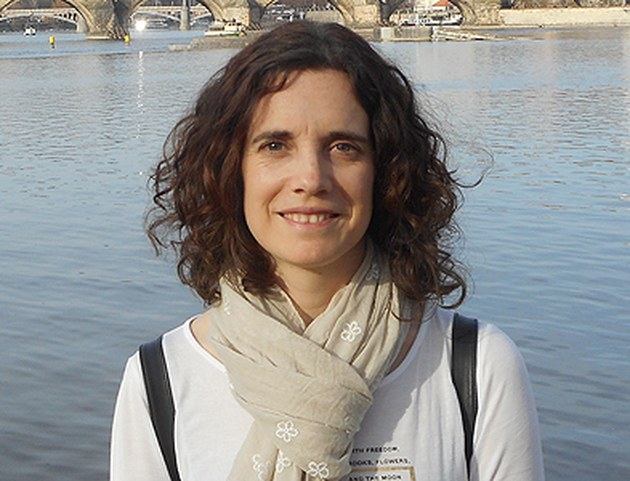 Dr. Anna Jurado Elices © A. Jurado, TUD
Dr. Anna Jurado studied geology at University of Barcelona (2005) and is an alumna of the 40th International Course on Groundwater Hydrology at the University of Catalunya (UPC, 2006). She completed her PhD thesis on " Occurrence and fate of emerging organic contaminants in groundwater. A case study: Barcelona" at UPC in 2013. After her PhD, she worked on the impact of groundwater on greenhouse gas emissions from rivers at the Working Group for Hydrogeology and Environmental Geology at University of Liège in Belgium. At TUD, Dr. Jurado works with the Junior Research Group INOWAS under supervision of Prof. Rudolf Liedl (Institute for Groundwater Management), JProf. Marc Walther (Chair of Contaminant Hydrology, jointly appointed with UFZ) and Dr. Catalin Stefan (Leader of INOWAS group). Her research focuses on investigations concerning the fate of emerging organic pollutants during Managed Aquifer Recharge (MAR). She is especially interested in elucidation of degradation processes and identification of conditions promoting the removal of pharmaceutical residues during MAR.
Dr. Anna Jurado Elices © A. Jurado, TUD
Dr. Anna Jurado studied geology at University of Barcelona (2005) and is an alumna of the 40th International Course on Groundwater Hydrology at the University of Catalunya (UPC, 2006). She completed her PhD thesis on " Occurrence and fate of emerging organic contaminants in groundwater. A case study: Barcelona" at UPC in 2013. After her PhD, she worked on the impact of groundwater on greenhouse gas emissions from rivers at the Working Group for Hydrogeology and Environmental Geology at University of Liège in Belgium. At TUD, Dr. Jurado works with the Junior Research Group INOWAS under supervision of Prof. Rudolf Liedl (Institute for Groundwater Management), JProf. Marc Walther (Chair of Contaminant Hydrology, jointly appointed with UFZ) and Dr. Catalin Stefan (Leader of INOWAS group). Her research focuses on investigations concerning the fate of emerging organic pollutants during Managed Aquifer Recharge (MAR). She is especially interested in elucidation of degradation processes and identification of conditions promoting the removal of pharmaceutical residues during MAR.
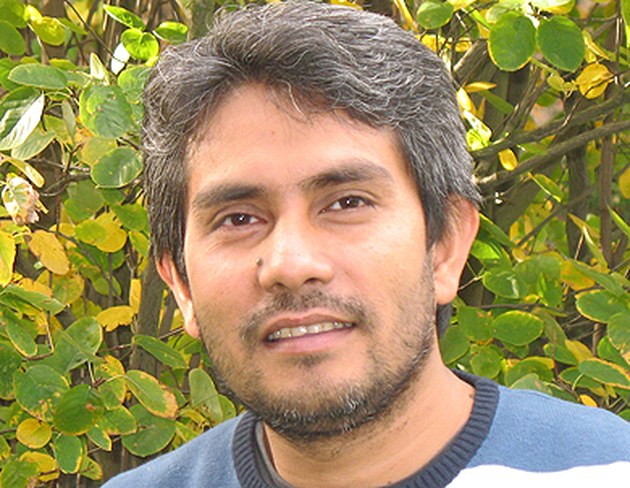 Dr. Bishawjit Mallick © Bianca Sander, TUD
Dr. Bishawjit Mallick from Bangladesh works with Prof. Jochen Schanze at the Chair of Environmental Development and Risk Management. He studied „Urban and Rural Planning“ at Khulna University in his home country Bangladesh and Regional Sciences/Spatial Planning at University of Karlsruhe in Germany. In 2013 he got his PhD from Karlsruhe Institute of Technology (KIT) with a thesis on “How society handles increasing vulnerability: An analysis of social conditions for vulnerability oriented spatial planning in the coastal zone of Bangladesh”. After his PhD, he worked as a guest scientist at University of Oxford’s International Migration Institute (IMI) and at Leibnitz Institute for Research on Society and Space (IRS) in Erkner near Berlin. At TU Dresden, Dr. Mallick works on the topic „Non-Migrability - Non-Migration of People at Risks in the Context of Social and Economic Vulnerability“. He is particularly interested in social and economic factors that are decisive for ensuring that people remain in their homes despite the dangers posed by cyclones and the consequences of climate change and do not migrate. To identify these factors, he conducts statistical surveys and in-depth interviews in peripheral coastal areas of Bangladesh. Since research on non-migration is still in its infancy, the results can also be of particular relevance internationally.
Dr. Bishawjit Mallick © Bianca Sander, TUD
Dr. Bishawjit Mallick from Bangladesh works with Prof. Jochen Schanze at the Chair of Environmental Development and Risk Management. He studied „Urban and Rural Planning“ at Khulna University in his home country Bangladesh and Regional Sciences/Spatial Planning at University of Karlsruhe in Germany. In 2013 he got his PhD from Karlsruhe Institute of Technology (KIT) with a thesis on “How society handles increasing vulnerability: An analysis of social conditions for vulnerability oriented spatial planning in the coastal zone of Bangladesh”. After his PhD, he worked as a guest scientist at University of Oxford’s International Migration Institute (IMI) and at Leibnitz Institute for Research on Society and Space (IRS) in Erkner near Berlin. At TU Dresden, Dr. Mallick works on the topic „Non-Migrability - Non-Migration of People at Risks in the Context of Social and Economic Vulnerability“. He is particularly interested in social and economic factors that are decisive for ensuring that people remain in their homes despite the dangers posed by cyclones and the consequences of climate change and do not migrate. To identify these factors, he conducts statistical surveys and in-depth interviews in peripheral coastal areas of Bangladesh. Since research on non-migration is still in its infancy, the results can also be of particular relevance internationally.
More information here.

